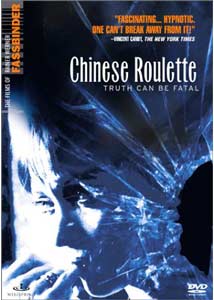 Relatively minor Fassbinder, but no less effective than many of his more prominent features in its satire upon middle class conventions, notably marriage, and the manipulative relationships between individuals. Gerhard (Alexander Allerson) and Ariane (Margit Cartensen) are a typical Fassbinder married couple; where superficially everything seems together, but there is always something going on beneath the surface which is far more sinister. They are both about to travel on business; he's going to Oslo, she's going to Milan. Of course this is just a ruse to deceive each other as both are about the meet up with their lovers. Gerhard collects Irene (Anna Karina) at the airport and whisks her off to their country retreat, where of course they stumble upon Ariane and her lover, Kolbe (Ulli Lommel), a business associate of Gerhard's.
Relatively minor Fassbinder, but no less effective than many of his more prominent features in its satire upon middle class conventions, notably marriage, and the manipulative relationships between individuals. Gerhard (Alexander Allerson) and Ariane (Margit Cartensen) are a typical Fassbinder married couple; where superficially everything seems together, but there is always something going on beneath the surface which is far more sinister. They are both about to travel on business; he's going to Oslo, she's going to Milan. Of course this is just a ruse to deceive each other as both are about the meet up with their lovers. Gerhard collects Irene (Anna Karina) at the airport and whisks her off to their country retreat, where of course they stumble upon Ariane and her lover, Kolbe (Ulli Lommel), a business associate of Gerhard's.There are no arguments, no histrionics, no violence. What follows is very much in the bourgeois tradition of holding one's own and maintaining one's grace. All four are embarrassed and unsure how to react. They laugh and shake hands, and Gerhard's response is very measured and sensible, explaining that he should ask the housekeeper, Kast (Bridgitte Mira) to cook more food. They can't fathom how this misunderstanding occurred; how both sets of lovers managed to commit their infidelity in the same place at the same time. It all becomes clear with the arrival of Gerhard and Ariane's daughter, Angela (Andrea Schober), a young girl on crutches. She evidently set this entire situation up and clearly has some issues to resolve with her parents. She mentions to the housekeeper's son that her illness coincided with her father's affair, and that her mother started her affair when Angela was told she would never walk again. She thinks they both hate her for ruining their lives. Is this set up Angela's revenge?
The light-heartedness of the lovers' exposure takes on a darker, more sinister twist, initiated by Angela. She wants to play Chinese Roulette, a game in which there are two teams and one team asks questions along the lines "what would you be if you were a coin?" or "what kind of animal would you be?" whilst the other answers. The answers each provides is no doubt supposed to revelatory. Even in these simple questions, Angela's guardian Traunitz (Macha Meril) provides answers with unsettle. The questions that become more disturbing, culminating in one asking "who would you have been during the Third Reich?", which Angela answers as the commander of Belsen. At this point the film takes a more tragic turn albeit with a fairly unresolved climax.
As is always the case with Fassbinder, one of the main plus points is the camerawork of Michael Ballhaus, later the DoP of Martin Scorsese. The 360 degree rotations of the camera that were very evident in the likes of 'Martha' (1974) are used frequently. Used in Hollywood melodrama usually to symbolise moments of great romance, Fassbinder subverts this notion, utilising this technique for moments where romance takes a darker or more uncertain twist. Always elaborate and roaming, the camera follows the protagonists and often captures them in close up during moments of great shock or crisis. Ballhaus and Fassbinder use the camera to propel the narrative as much as dialogue or plot does. By placing marriage vows on the screen at the film's climax, Fassbinder reiterates his position of marriage as an emotionally restricting and unfulfilling institution which the bourgeoisie desperately seeks to hold together despite undermining it at every opportunity. That Gerhard and Ariane don't know how to react when caught out by the other shows their mutual emotional stuntedness and inability to deal with emotional crises. Fassbinder had tackled these type of relationships before, so it was hardly new ground for him, but one can never deny how successful he was more often than not doing so, which is more notable considering his ridiculous productivity as a film maker. 4/5
No comments:
Post a Comment